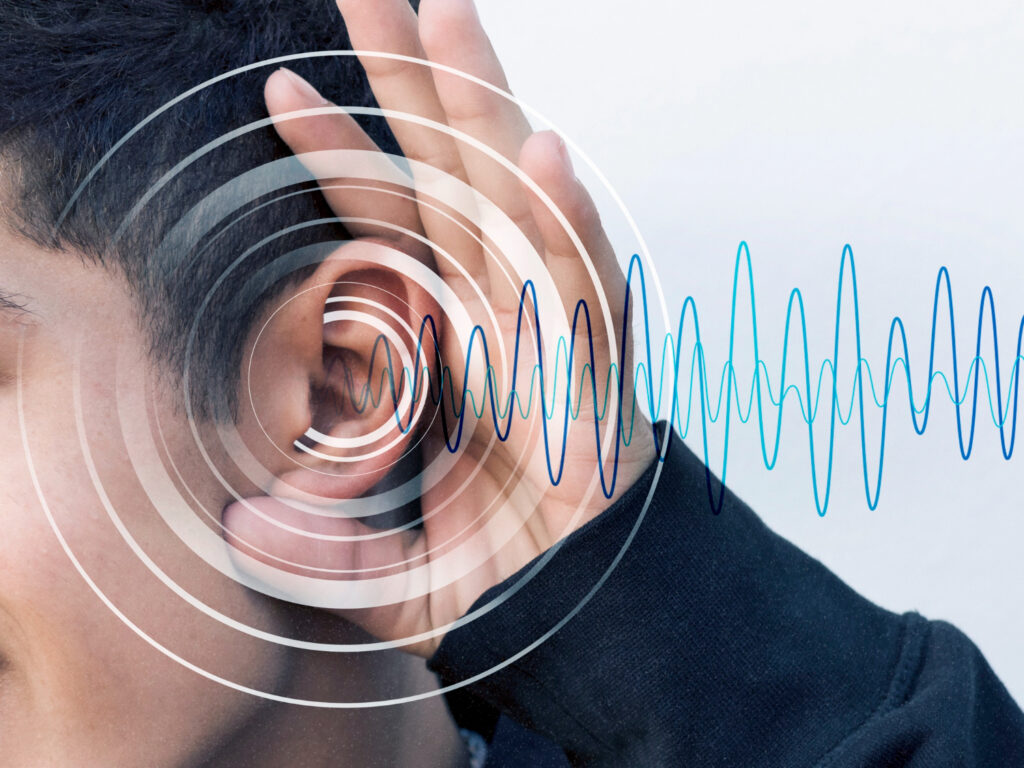
In this article
Tinnitus (pronounced ti-NIGH-tus), often described as ringing in the ears, encompasses a range of sounds including buzzing, hissing, chirping, whistling, or other noises. These sounds may be constant or intermittent, varying in loudness, and can affect one or both ears. The absence of background noise, such as when trying to sleep, often makes tinnitus more noticeable.
This condition is widespread, affecting millions of adults in the U.S. While many find it merely annoying, tinnitus can significantly impact concentration and sleep, interfering with work and personal relationships.
Causes and Mechanisms
Tinnitus often results from underlying causes. Treating these can sometimes alleviate the symptoms, but frequently, tinnitus cannot be completely cured. Various strategies exist to mask or reduce the impact of the noise.
Sound waves travel through the ear canal, causing the eardrum to vibrate. These vibrations are transformed into electrical signals by cells in the cochlea, which the brain interprets as sound. Damage anywhere in this auditory pathway can lead to tinnitus. Although associated with hearing loss, tinnitus does not directly cause it, nor does hearing loss cause tinnitus. Experts believe that when hearing is impaired, the brain changes how it processes sound, potentially creating phantom noises.
Tinnitus and Hyperacusis
Some individuals with tinnitus may also experience hyperacusis, an increased sensitivity to sound. This condition can make even normal levels of noise uncomfortable, necessitating measures to muffle or mask everyday sounds.
Common Causes of Tinnitus
Noise-Induced Hearing Loss: Prolonged exposure to loud sounds is a primary cause, affecting up to 90% of tinnitus sufferers. Occupations involving constant noise, such as those of carpenters, pilots, musicians, and landscapers, pose significant risks. Even a single exposure to an extremely loud noise, like a gunshot, can trigger tinnitus.
Aging: The natural aging process can deteriorate cells in the inner ear and associated nerve fibers, leading to both hearing loss and tinnitus.
Ear Blockages: Conditions like congestion, ear infections, or excess earwax can create pressure in the inner ear, potentially causing tinnitus. Addressing these blockages often relieves symptoms unless the blockage has caused long-term damage.
Medications: Over 200 medications, including aspirin, certain antibiotics, diuretics, antidepressants, and chemotherapy drugs, can induce tinnitus. The effect varies with the drug and dosage, and in some cases, tinnitus may cease once the medication is discontinued.
Injuries: Head or neck injuries affecting nerves, blood flow, or muscles can lead to tinnitus, along with headaches and memory issues.
Medical Conditions: Various health issues can cause tinnitus, including:
- Meniere’s disease
- Otosclerosis
- Temporomandibular joint (TMJ) syndrome
- Acoustic neuroma (a tumor on the auditory nerve)
- Migraines
- Traumatic brain injuries
- Cardiovascular diseases
- Circulatory problems
- Anemia
- Allergies
- Thyroid disorders
- Autoimmune diseases
- Diabetes
- Fibromyalgia
- Vitamin deficiencies
- Hormonal changes
- Mental health conditions like depression or anxiety
A rare form of tinnitus, called pulsatile tinnitus, aligns with the heartbeat and may indicate a vascular issue, warranting immediate medical attention.
Factors That Can Worsen Tinnitus
Continued exposure to loud noises can exacerbate tinnitus. Protective measures such as earplugs or noise-canceling headphones are essential. Additionally, alcohol, caffeine, smoking, certain foods, stress, and fatigue can intensify symptoms.
Identifying Tinnitus
To determine if you have tinnitus, consult your doctor, who will assess your medical history and conduct various tests. Descriptions of tinnitus vary widely; it can sound like ringing, buzzing, humming, clicking, whistling, squealing, hissing, roaring, or even music.
Diagnosing Tinnitus
Doctors typically start with a detailed medical history and a hearing test, examining your head, neck, and ears. Movements such as clenching your jaw or moving your neck can help identify the cause. Imaging tests like CT or MRI scans may also be necessary.
Treatment Options
Treatment depends on the underlying cause. If medication is the trigger, your doctor might adjust your prescription. Conditions like high blood pressure may require targeted treatments to alleviate tinnitus. Excess earwax can be safely removed by a professional.
Managing Tinnitus
Since tinnitus often cannot be completely cured, management focuses on reducing its impact. Options include:
- Hearing Aids: Amplifying external sounds can make tinnitus less noticeable, especially in cases of age-related hearing loss.
- Sound Maskers: Devices worn in or behind the ear generate white noise to mask tinnitus. White noise machines can also aid sleep.
- Relaxation Techniques: Stress exacerbates tinnitus, so practices like yoga, deep breathing, and biofeedback can help.
- Cognitive Behavioral Therapy (CBT): This therapy helps manage the emotional responses to tinnitus, improving overall quality of life.
- Medications: While no drugs are specifically approved for tinnitus, some antidepressants or antianxiety medications can help manage the condition.
- Tinnitus Retraining Therapy (TRT): This combines counseling and sound habituation, helping the brain ignore tinnitus sounds over 6-18 months.
Communicating with Your Doctor
Effective management of tinnitus involves understanding the condition and exploring treatment options. Key questions to ask your doctor include:
- What is causing my tinnitus?
- Will it go away on its own?
- Does tinnitus indicate hearing loss?
- What treatments are available?
- Are there risks or side effects?
- How can I manage tinnitus myself?
- How can I prevent it from worsening?
The Takeaway
Tinnitus, characterized by a perception of sound without an external source, can range from a minor annoyance to a significant disruption. While it isn’t dangerous, it can affect concentration and sleep. Treatment and management strategies can help reduce its impact, making it easier to live with the condition
A Quick Review
Tinnitus, a condition where individuals hear sounds like ringing or buzzing without an external source, can be caused by noise exposure, aging, ear blockages, medications, and more. While it often can’t be cured, treatments like hearing aids, sound maskers, and cognitive behavioral therapy can help manage its impact. Protecting your ears from loud noises and reducing stress are crucial in mitigating symptoms
FAQS
What causes tinnitus?
Tinnitus can be caused by prolonged exposure to loud noises, aging, ear blockages, certain medications, injuries, and various medical conditions such as Meniere’s disease and high blood pressure.
Can tinnitus be cured?
While tinnitus often can’t be completely cured, managing underlying causes and using treatments like hearing aids, sound maskers, and therapy can help reduce its impact.
How is tinnitus diagnosed?
Diagnosis involves a thorough medical history, hearing tests, and possibly imaging tests like CT or MRI scans. Your doctor may also examine your head, neck, and ears.
What treatments are available for tinnitus?
Treatments include hearing aids, sound maskers, relaxation techniques, cognitive behavioral therapy, and tinnitus retraining therapy. Addressing underlying health issues can also help.











